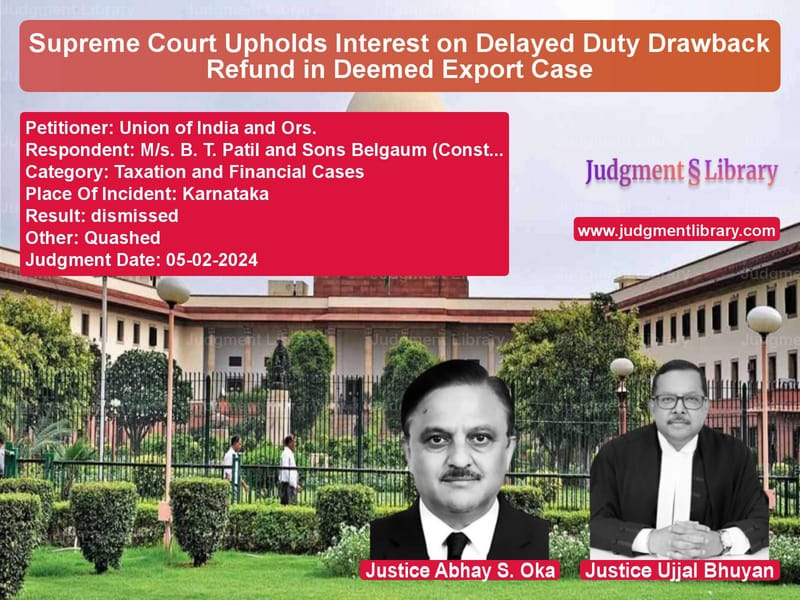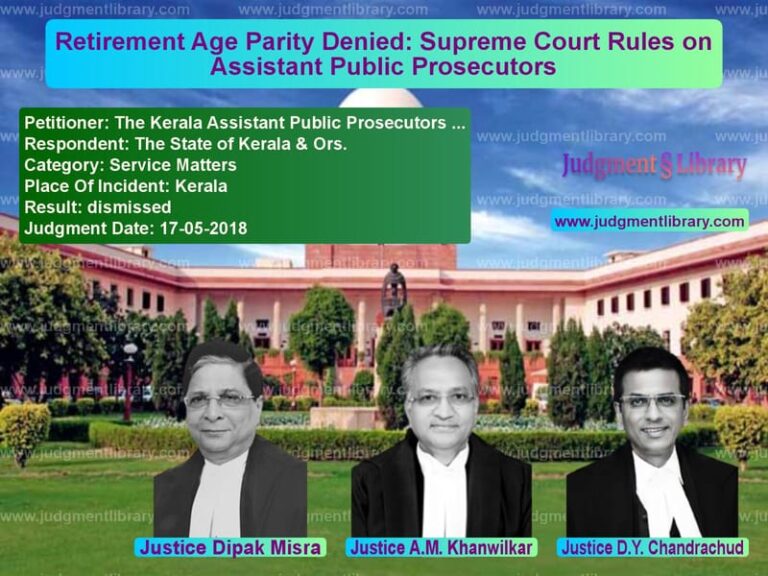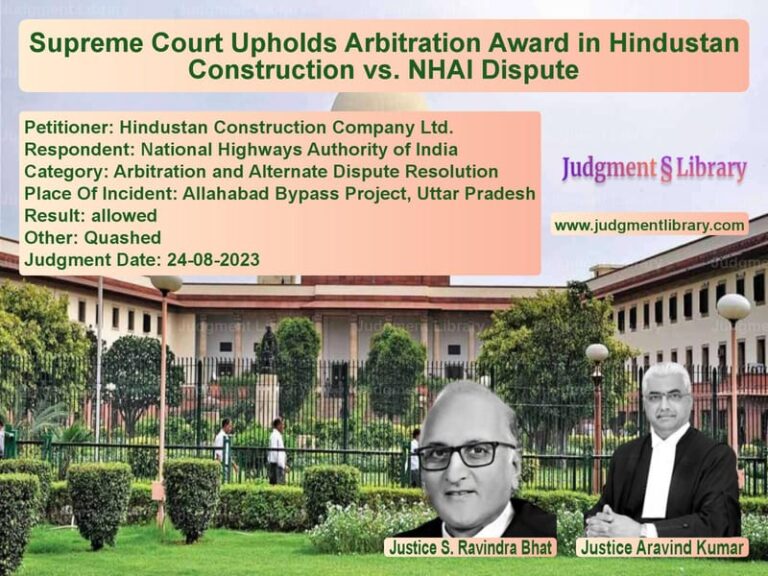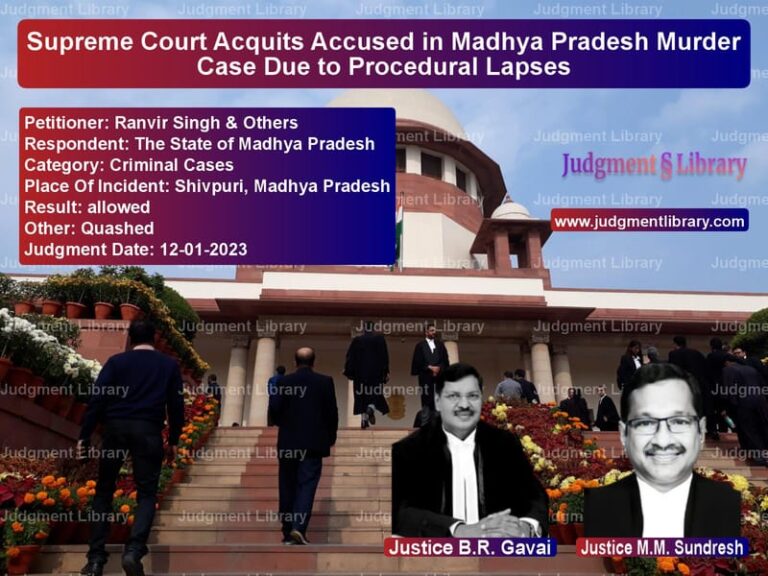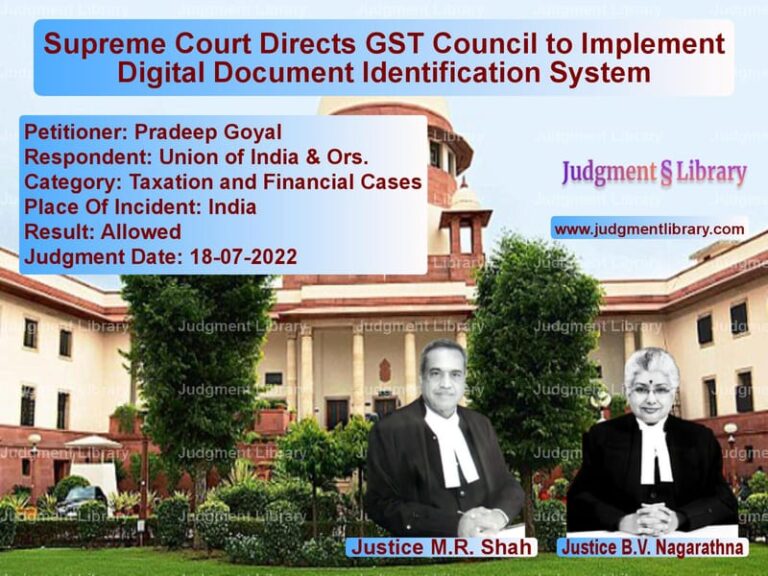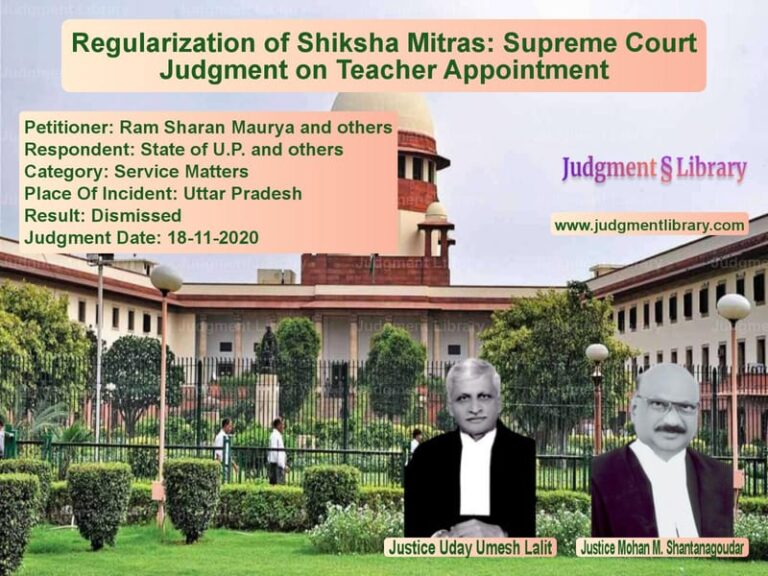Supreme Court Upholds Interest on Delayed Duty Drawback Refund in Deemed Export Case
The Supreme Court of India has ruled in favor of M/s. B. T. Patil and Sons Belgaum (Construction) Pvt. Ltd., affirming their entitlement to interest on the delayed refund of duty drawback under the deemed export scheme. The case, which involved the Union of India and the Director General of Foreign Trade (DGFT), revolved around the delayed payment of duty drawback for a World Bank-funded hydroelectric project in Maharashtra.
Background of the Case
M/s. B. T. Patil and Sons Belgaum (Construction) Pvt. Ltd., a class-I contractor specializing in civil contract works, was awarded a sub-contract under the Koyna Hydro Electric Power Project in Maharashtra. This project was funded by the International Bank for Reconstruction and Development (World Bank). The company completed its construction work in March 1996 and subsequently applied for duty drawback under the Exim Policy 1992-1997.
However, the DGFT initially rejected their applications, stating that supplies in civil construction work were not eligible for deemed export benefits. After multiple representations and a change in policy interpretation, the DGFT eventually approved the duty drawback refund in 2002, amounting to Rs. 2,05,79,740. Despite this refund, the company sought interest for the delayed payment, which the DGFT denied.
Legal Proceedings
1. Writ Petition in the Karnataka High Court
Aggrieved by the rejection of interest, the company filed a writ petition in the Karnataka High Court. The learned Single Judge ruled in favor of the petitioner, holding that since there was a delay in refunding the duty drawback, interest should be paid at the rate of 15% per annum from December 5, 2000, until the payment date.
2. Appeal Before the Division Bench
The Union of India and the DGFT challenged this ruling before the Division Bench, arguing that interest was not applicable as the refund was granted as a special case. The Division Bench dismissed the appeal, holding that deemed exports included civil construction projects and that the company was entitled to interest from the expiry of three months after submitting its refund applications in 1996.
3. Supreme Court Appeal
The Union of India escalated the matter to the Supreme Court, contending that the refund was an exceptional case and that there was no provision under the Exim Policy 1992-1997 for interest on delayed refunds.
Arguments by the Appellants (Union of India and DGFT)
- The refund was granted as a one-time exception and should not set a precedent.
- Circulars dated August 20, 1998, and December 5, 2000, were issued under the Exim Policy 1997-2002 and could not be applied retrospectively to the 1992-1997 policy.
- There was no provision under the Exim Policy 1992-1997 for granting interest on delayed refunds.
- The company continued submitting representations despite repeated rejections, leading to administrative delays.
Arguments by the Respondent (M/s. B. T. Patil and Sons Belgaum)
- The refund was granted based on a legitimate entitlement under the deemed export scheme and not as a special concession.
- The delay in payment caused financial hardship, justifying the claim for interest.
- The provisions of the Customs Act, 1962, including Section 27A, entitled them to interest on delayed refunds.
- The DGFT’s own Policy Interpretation Committee had clarified that civil construction projects were eligible for deemed export benefits.
Supreme Court’s Observations
1. Entitlement to Duty Drawback
The Court confirmed that under the Exim Policy 1992-1997, the company was eligible for duty drawback as a deemed export. It emphasized that this was not a one-time concession but a legitimate benefit under the policy.
2. Clarificatory Circulars and Their Retrospective Effect
The Court ruled that the 1998 and 2000 circulars merely clarified existing policy provisions and did not introduce new benefits. Therefore, these circulars had retrospective applicability, and civil construction projects were entitled to duty drawback under the Exim Policy 1992-1997.
3. Delay in Refund and Applicability of Interest
Referring to Section 27A of the Customs Act, the Court observed:
“Where duty drawback is not paid within three months from the date of filing a claim, the claimant is entitled to interest in addition to the refund amount.”
Since the refund applications were filed in 1996 and approved only in 2002, the delay warranted interest payment.
4. Rate of Interest
The Court upheld the 15% interest rate awarded by the High Court, noting that the Central Board of Excise and Customs had prescribed this rate under Notification No. 32/1995 (NT) – Customs dated May 26, 1995.
Final Judgment
- The Supreme Court dismissed the appeal filed by the Union of India and DGFT.
- It upheld the Karnataka High Court’s ruling, confirming the respondent’s entitlement to interest on delayed duty drawback refunds.
- The 15% interest rate was deemed appropriate based on statutory provisions.
Legal and Economic Implications
1. Strengthening the Rights of Exporters
This ruling reinforces the principle that exporters are entitled to timely refunds and compensation for delays, enhancing confidence in India’s trade policies.
2. Clarity in Policy Interpretation
By holding that clarificatory circulars have retrospective effect, the judgment ensures uniform application of export policies, preventing arbitrary denial of benefits.
3. Government Accountability
The decision serves as a reminder that administrative delays in processing refunds can result in financial liabilities for the government.
4. Impact on Future Deemed Export Cases
This judgment sets a precedent for similar cases where exporters face delayed refunds under deemed export schemes.
Conclusion
The Supreme Court’s decision in this case upholds the fundamental right of exporters to receive duty drawback refunds in a timely manner. By affirming interest on delayed payments, the Court has reinforced the importance of procedural fairness and government accountability. This ruling will likely influence future trade policy interpretations and ensure greater transparency in refund mechanisms under India’s export-import framework.
Petitioner Name: Union of India and Ors..Respondent Name: M/s. B. T. Patil and Sons Belgaum (Construction) Pvt. Ltd..Judgment By: Justice Abhay S. Oka, Justice Ujjal Bhuyan.Place Of Incident: Karnataka.Judgment Date: 05-02-2024.
Don’t miss out on the full details! Download the complete judgment in PDF format below and gain valuable insights instantly!
Download Judgment: union-of-india-and-o-vs-ms.-b.-t.-patil-and-supreme-court-of-india-judgment-dated-05-02-2024.pdf
Directly Download Judgment: Directly download this Judgment
See all petitions in Tax Refund Disputes
See all petitions in Customs and Excise
See all petitions in Judgment by Abhay S. Oka
See all petitions in Judgment by Ujjal Bhuyan
See all petitions in dismissed
See all petitions in Quashed
See all petitions in supreme court of India judgments February 2024
See all petitions in 2024 judgments
See all posts in Taxation and Financial Cases Category
See all allowed petitions in Taxation and Financial Cases Category
See all Dismissed petitions in Taxation and Financial Cases Category
See all partially allowed petitions in Taxation and Financial Cases Category

